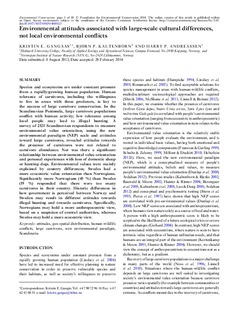| dc.contributor.author | Gangås, Kristin Evensen | |
| dc.contributor.author | Kaltenborn, Bjørn P. | |
| dc.contributor.author | Andreassen, Harry Peter | |
| dc.date.accessioned | 2014-05-12T08:06:48Z | |
| dc.date.available | 2014-05-12T08:06:48Z | |
| dc.date.issued | 2014 | |
| dc.identifier.citation | Gangås, K.E., Kaltenborn, B.P. & Andreassen, H.P. (2014). Environmental attitudes associated with large-scale cultural differences, not local environmental conflicts. Environmental conservation. DOI: 10.1017/S0376892914000125 | nb_NO |
| dc.identifier.uri | http://hdl.handle.net/11250/194806 | |
| dc.description.abstract | Species and ecosystems are under constant pressure from a rapidly-growing human population. Human tolerance of carnivores, including the willingness to live in areas with these predators, is key to the success of large carnivore conservation. In the Scandinavian Peninsula, large carnivore populations conflict with human activity; low tolerance among local people may lead to illegal hunting. A survey of 2521 Scandinavian respondents to measure environmental value orientation, using the new environmental paradigm (NEP) scale and attitudes toward large carnivores, revealed attitudes towards the presence of carnivores were not related to carnivore abundance. Nor was there a significant relationship between environmental value orientation and personal experiences with loss of domestic sheep or hunting dogs. Environmental values were mainly explained by country differences; Swedes had a more ecocentric value orientation than Norwegians. Significantly more Norwegians (45 %) than Swedes (19 %) responded that there were too many carnivores in their country. Historic differences in how government is perceived between Norway and Sweden may result in different attitudes towards illegal hunting and towards carnivores. Specifically, Norwegians may hold a more anthropocentric view, based on a suspicion of central authorities, whereas Swedes may hold a more ecocentric view. | nb_NO |
| dc.language.iso | eng | nb_NO |
| dc.publisher | Foundation for Environmental Conservation | nb_NO |
| dc.subject | geo-spatial distribution | nb_NO |
| dc.subject | human-wildlife conflicts | nb_NO |
| dc.subject | Scandinavia | nb_NO |
| dc.subject | new environmental paradigm | nb_NO |
| dc.subject | large carnivores | nb_NO |
| dc.title | Environmental attitudes associated with large-scale cultural differences, not local environmental conflicts | nb_NO |
| dc.type | Journal article | nb_NO |
| dc.type | Peer reviewed | nb_NO |
| dc.source.journal | Environmental conservation | nb_NO |
| dc.identifier.doi | 10.1017/S0376892914000125 | |
